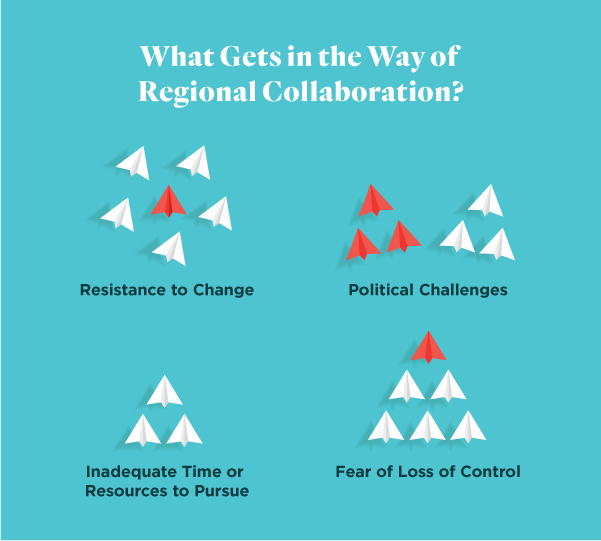
Author: Seth Garrison, Senior Manager (Email)
Most public agencies are accustomed to doing more with less. They are constantly scrutinizing their activities, keeping staffing lean, and looking for efficiencies while still addressing evolving demands for better and more affordable services. While this focus on continuous improvement has become the way to do business, public agencies must also look externally for opportunities. Neighboring public agencies are also doing more with less, and by sharing knowledge the result can be improved services. Opportunities range from joint contracting, resource sharing, and partnering on projects; to more comprehensive regionalization and consolidation.
Neighboring agencies have often been viewed as competitors, jockeying for desirable customers, competing for limited industry talent, and jealously comparing facilities and services. Instead, looking at neighbors as partners can pay dividends for both parties. Some municipalities have learned that working together to attract new businesses can benefit everyone. Effective partnerships in Charleston, South Carolina, for example, allowed the region to attract investments by Boeing and Volvo. Cooperation has been instrumental in allowing the water suppliers in the Dallas metro region to share water resources that serve their rapidly growing customer bases. Less grand efforts where communities share certain assets such as fire and public safety equipment or do joint training are staples in many regions across the country.
There many forms of collaboration that can be considered. Here are just a few of the common ones:
With cooperation efforts come challenges, such as time availability, past relationships and trust, sustaining interest, political issues, span of control issues, and organizational barriers that prevent consensus building and effective communications. These need to be addressed for efforts to be successful.

Bringing a consultant firm like Raftelis in from the outside allows for a level of objectivity and analysis that is hard to duplicate. When we’re working toward the benefit all parties, there is no concern of bias. As fiduciaries, registered as Municipal Financial Advisors with the U.S. Securities and Exchange Commission and the Municipal Securities Rulemaking Board, Raftelis must always act in the best interest of its clients. Having an outside entity involved gives all the parties confidence that an unbiased set of recommendations will be produced.
Raftelis has fostered collaboration among many entities. Below are case studies of where Raftelis has helped bring parties together for the benefit of their customers: